- Home
- A. S. Byatt
The Game
The Game Read online
A. S. Byatt
The Game
A. S. Byatt is famed for her short fiction, collected in Sugar and Other Stories, The Matisse Stories, and The Djinn in the Nightingale’s Eye. Her full-length novels include the Booker Prize–winning Possession and the trilogy sequence of novels The Virgin in the Garden, Still Life, and Babel Tower. She has also published four volumes of critical work, of which Imagining Characters is the most recent. She lives in London.
BOOKS BY A. S. Byatt
FICTION
The Shadow of the Sun
The Game
The Virgin in the Garden
Still Life
Sugar and Other Stories
Possession: A Romance
Angels and Insects
The Matisse Stories
Babel Tower
The Djinn in the Nightingale’s Eye
Elementals
The Biographer’s Tale
CRITICISM
Degrees of Freedom: The Novels of Iris Murdoch
Unruly Times: Wordsworth and Coleridge in Their Time
Passions of the Mind: Selected Writings
Imagining Characters (with Ignês Sodré)
First Vintage International Edition, November 1992
Copyright © 1967 by A. S. Byatt
All rights reserved under International and Pan-American Copyright Conventions. Published in the United States by Vintage Books, a division of Random House, Inc., New York, and distributed in Canada by Random House of Canada Limited, Toronto. Originally published in Great Britain in hardcover by Chatto & Windus, in 1967.
Library of Congress Cataloging-in-Publication Data Byatt, A. S. (Antonia Susan), 1936–
The game / A. S. Byatt. —1st Vintage International ed.
p. cm.
eISBN: 978-0-307-81955-0
I. Title.
PR6052. Y2G36 1992
823’.914—dc20 92-53581
v3.1
For
JOHN BEER
Contents
Cover
About the Author
Other Books by This Author
Title Page
Copyright
Dedication
Epigraph
Chapter 1
Chapter 2
Chapter 3
Chapter 4
Chapter 5
Chapter 6
Chapter 7
Chapter 8
Chapter 9
Chapter 10
Chapter 11
Chapter 12
Chapter 13
Chapter 14
Chapter 15
Chapter 16
Chapter 17
Chapter 18
Chapter 19
Chapter 20
Chapter 21
We wove a web in childhood
A web of sunny air;
We dug a spring in infancy
Of water pure and fair;
We sowed in youth a mustard seed,
We cut an almond rod;
We are now grown up to riper age —
Are they withered in the sod?
Faded! the web is still of air,
But how its folds are spread,
And from its tints of crimson clear
How deep a glow is shed …
The mustard-seed in distant land
Bends down a mighty tree,
The dry unbudding almond-wand
Has touched eternity.
from Retrospection CHARLOTTE BRONTË, 1835
The principle of the imagination resembles the emblem of the serpent, by which the ancients typified wisdom and the universe, with undulating folds, for ever varying and for ever flowing into itself — circular, and without beginning or end.
S. T. COLERIDGE
Chapter 1
‘COME again soon,’ Julia said, arresting them again at the top of the stairs, smiling and pleading. ‘I mean it, I really mean it. You must come again.’ They laughed, drawn together by their departure, their faces pale and round above coat-collars already turned up against the cold. ‘Promise,’ said Julia, and they promised, and began to descend the turning staircase. Julia hung over the banister watching their dark heads protectively down three flights, saddened by the receding clatter of their feet. At the bottom they stopped and turned their moon-faces up to her. ‘Thank you,’ they called, and Julia cried, ‘We loved having you.’
She stood a moment twisting her rings on her fingers. She had several rings, all rather boldly designed and clean-cut, silver and bronze, hoops and bosses. Her hands seemed slightly heavy with them. She went back, then, into the flat.
In the attic living-room everything was warm. The wood fire was still alive in the hearth, and the room was hazy with soft smoke. The floor was polished bare boards, spread with long-furred rugs, and there were several low stools on which Julia would sit, her knees drawn up to her chin, close to the fire. There were earthy-brown coffee mugs squat on a low table, two stainless-steel bowls of fruit, a scarlet glass tray with liqueur glasses. Julia sniffed smoke and wine and was aware of worry. Somewhere, plates clashed.
She went through the living-room into the kitchen, where, at a pale blue and grey sink, under a fluorescent light, her husband in shirtsleeves was piling plates shining with water, one after the other, on to a stainless-steel draining-board.
‘We don’t have to wash up just yet?’
‘It doesn’t take a minute. I feel better when things are in place.’ He cast her a placatory glance. ‘You don’t have to help.’ Julia picked up a tea-towel.
‘Thor,’ she said, ‘it went well, didn’t it? They liked it, didn’t they? I mean, they were exactly the people to try out that honey sauce on?’ She dried some plates. ‘They liked me, didn’t they? You can tell if people like you. I liked them enormously. The sort of people who can become real friends —’
‘Yes,’ said Thor. He took a deep-blue linen cloth and began to polish carving knives, his cropped blond head very pale under the pale light. After a moment he offered, ‘I think he will ask you to appear on his programme.’
Julia studied her hands. ‘I didn’t ask him for that.’
‘I know. He doesn’t think you did. He liked you. He said you were very much alive.’
‘Did he?’ Julia strode back into the living-room. ‘Did he really, Thor? I thought he was alive, didn’t you? I thought that the moment I met him. He’s got such energy. He cares so much about everything. That’s rare. And he’s so intelligent. Both of them are so intelligent —’
She sat down on a leather stool by the fire.
‘I wonder if I talked too much. I always do, I get carried away, I know you think.… He’s a man you could tell anything to. Almost anything. I’m sure he thought I talked too much.’
‘Why should he? He was curious.’ He thought a moment. ‘There are so many people you can tell anything to, Julia.’
Julia was not sure where, in this sentence, the emphasis was; one of the traces of her husband’s Norwegian birth was the uniform flatness of his sentences. Thus she did not know whether she was being rebuked or not. This was the sort of minor moral indecision which he often provoked in her.
‘I should hate him to think I was effusive.’
‘I do not think he thought that.’
‘Honestly?’
‘Honestly.’
There was a silence. Julia said, ‘I wish I didn’t always feel so overwhelmed.’
Thor put a large hand across her shoulder, and rubbed her white crêpe dress against her skin.
‘Julia – be a little peaceful, sometimes. Don’t mind things so much. It isn’t good.’
Julia shrugged quickly and then relaxed. ‘One ought to mind. One ought to care. I love it, meeting people, really —’
‘That’s not what I mean.
You will not simply take what is given. What comes.’
‘But that’s just what I do. That’s what I thought you were complaining about. I take and take and take. Everything’s given. More than I can manage.’
‘I do not know what you mean by everything is given,’ said Thor, his northern foreignness slightly more pronounced. ‘In the nature of things, it cannot be. I agree, you will behave as though everything was … available. It tires you. Besides, you know yourself, you insure against a poverty, Julia.’
‘Don’t,’ said Julia. ‘Don’t tell me. You know so much, but you don’t have to tell me.’
He stiffened into silence. Julia leaned her face against his legs. ‘You know me, you know me so well. I love you. But don’t frighten me. Don’t take me up too much.’
‘You are easy to frighten,’ he said, in the same easy expressionless voice. He knelt down beside her; Julia said quickly, ‘And anyway I’m not fussing, it was a good dinner-party, it was a success.’
‘It was a good party, yes. And they liked you. I’m glad they liked you.’ She leaned towards him, and their mouths met, lightly.
‘Thor —’ said Julia.
‘I have a lot of work to do,’ he said, ‘before tomorrow. I don’t know why charity – why Christianity – should go with such a lack of sense of hard facts. They have faith, because they have promised grain, it will be forthcoming. They have faith that difficulties with transport and cash can be got round. Well some can, but only with my work. Also, they transfer to me the faith they would do better to reserve for God and then not take into account. I spend my time accomplishing near-miracles: it is different. And today three letters saying we are inefficient and extravagant with the half-crowns they so charitably put into the tin cans —’
Thor was paid administrator of a largish charitable organization run by the Quakers in conjunction with one or two other religious bodies. Often, after parties, he worked into the small hours, making Julia feel guilty, since their visitors were mostly her own professional acquaintances. He seemed indefatigable; but during dinner she had watched his abstracted face once or twice – he did not drink – had thought he was saving himself, and had been exhausted by the tension between keeping the conversation lively, and wondering whether to let it die and the visitors depart, so that he could work. She kissed him. ‘Well, mostly, their faith’s justified. Their faith in you, that is. You don’t promise what you can’t perform.”
‘No,’ he said, standing up. In the doorway he asked casually ‘Will you accept his offer?’
‘He hasn’t made it. And I haven’t thought.’
Thor smiled and closed himself out.
Left alone, slightly let down, Julia walked across the room and back, restlessly. She thought of Ivan, who had just left, and might want her on his television programme. She liked the idea of being promoted from being a woman writer to being – in some sense – an expert on the art of the novel. In her mind her own voice echoed, lively, stimulating. She would meet new people. Hopefully, ready to see it as a new world to be entered, she turned on the television.
The screen flickered. Julia had a momentary, jumping vision of a huge sheet of water in a haze of heat, and then, superimposed on this, the rounded, superlatively normal face of a girl whose cultured voice above her cultured pearls quavered, came into being, and continued. ‘… This is the first in a series of late-night programmes, largely with a scientific emphasis, although there will be plenty of glimpses of the exotic and the dangerous. There is something for everyone: scientists, geographers, animal-lovers, arm-chair explorers …’
Julia was annoyed; she intended to respect the television and here was this girl addressing her millions of audience with a prepared, gentle condescension – as though they were all very slightly mentally deficient. Also, Julia didn’t like travel programmes. She was urban to the depths of her country-bred soul, and couldn’t imagine living, or communicating anything to anyone, anywhere outside London. Travellers with travellers’ tales were always so jolly, their deserts and jungles so parochial, almost as though they had been built, or at least touched up, in the studio. A lorry-load of sand, a few plastic fronds, a dozen or so Negro extras.… The young woman tossed her smooth blonde head, was seen deliberately to restrain herself from touching her pearls, announced brightly that there would be a few words from the Reverend William Borran after this programme, and was suddenly swallowed into the jungle. Trees, and then water. Tunnels of water, wastes of water, an aerial view of the great, formless river, broken into innumerable little tributaries, bushy islands, dense clumps of vegetation, yielding again to water which slapped this way and that, sucked in and out of creeks, spread, swelled.
‘The Amazon basin,’ said the commentator. ‘It was first explored in 1500 by Vicente Yañez Pinzon, who referred to it as the Marañon – a name now generally reserved for the Upper Amazon, although geographers differ as to where the Marañon ends and the Amazon begins, or whether both names apply, in fact, to the same river. The Brazilian historian Costancio maintains that Marañon is derived from the Spanish word maraña – a tangle, a snarl …’
The voice was not orotund; there was a hesitance, a kind of suppressed urgency about it, as though these simple facts, maybe, would be misunderstood, or not believed.
‘In the rainy season the average depth is a hundred and twenty feet. But it may rise, suddenly, fifty-six feet, and transform the landscape. Nothing is fixed: maps are approximations. What we learn to recognize, or begin to study, one week, may not be there the next. The camera can only give a bare idea of the power, here, of physical flux – weather, as well as growth and decay …’
The smooth rapidity of the camera-work was good, Julia thought, as the eye left the water and stared up and out through row after row of huge trees, straining smoothly towards the sky. Only, as the camera made plain, they were not rows, there was no pattern, they were a mass. Julia’s eye was bewildered by a series of changes in focus – close-ups of knots of creepers or areas of powdery bark, vistas into the depths of eternally extended, haphazardly cluttered cathedrals, between whose pillars the sun occasionally burst in long, white, hissing stars which rested on the leaves – a phenomenon the camera can hold, as the eye cannot. It was alien and enveloping, in no way pretty.
‘A great effort of slow growth. Aldous Huxley said once that if Wordsworth had been familiar with tropical forests he would have found Nature less benign and illuminating. There is something here, he said, which is “foreign, appalling, and utterly inimical to intruding life”. A German traveller, Burmeister was distressed by the vegetation here because, he said “it revealed a spirit of restless selfishness, eager emulation, and craftiness”. Well, we take, from what we see, what we bring to it. “In our life alone does Nature live,” as Coleridge said. I would hope to approach these forests more neutrally. We are to observe unchecked, unchannelled growth, and the concomitant destruction. I believe we can learn from this; in civilized countries we have suppressed, or rigidly limited, our consciousness of these processes. But they are part of us, however decently we may tuck away, behind curtains, birth and death. We forget what we are …’
The voice faded on a possibly querulous note as the camera began suddenly to run over the ground, picking out patterns, breaking them.
‘The jungle floor. Dead leaves, reddish, yellowish, pinkish, darkish brown. Decaying, in innumerable layers, back into the soil. Springy to walk on, often treacherous. Patterns picked up by the camera.’
Long lines of dead leaves sagged together, falling into formlessness. Julia could almost smell decaying earth mould. The picture steadied; she was watching a path of ground, raised circles of overlapping leaves, lighter lines of fungus or pale grey mould.
‘No shape. Lumps, bumps …’
In the centre, on top of the slight mound, something moved and raised itself. The camera caught the momentary black brightness of an eye; triangular, flattened, smooth yet knobby, a shape appeared, a snake’s head, staring. A tongu
e flickered in and out.
‘Not a camera pattern, but a life adapted to the jungle floor. This is the bushmaster. Lachesis muta. Very venomous. They can grow to twelve feet – this specimen is not so long. The pattern on these coils is in fact a regular pattern designed to melt into the irregular pattern of the leaves, solid dark rhombs on a paler ground, with tubercular ridges, a rough surface. A beautiful creature.’
Julia, who hated snakes, had been trying to neutralize the slight shock this cleverly manoeuvred apparition had given her by telling herself, as she did during unbearable films, those about executions and torture, that the camera-work, the selection, was excellent. Now she was struck, not for the first time, by the phrase. Whatever one ought to think, she told herself, it was not true, snakes were not beautiful creatures; they were mutilated and ugly; their faces were evil. As a man could be ugly and one could so define him and no one would dispute it, so could a beast. We can recognize human beauty, she thought, for reasons. Our traditional horror of the serpent has something behind it. Snakes are dangerous and ugly, we are meant to be repelled by them. This thought, of course, led back to the idea that an ugly man must be bad or dangerous, and this, given qualifications for beauxlaids, for those whose beautiful thoughts moulded and transfigured their horrid features, Julia was prepared to believe. Things were so much more often than was likely what they seemed. One should not be over-subtle, and to call snakes beautiful was a perversion. Simon – Simon had done that. Simon had —
Julia reached for the Radio Times, turned her head back towards the television, and saw him.
He stood a little stiffly beside his snake, holding it down now at the base of the skull with an iron implement that looked as though it had been fetched from some mediaeval torture chamber. He had a long, mournful face, with concave planes spattered with the beginnings of a black beard. His hair was long and sprang away from his head in wiry curls. His expression was both pompous and deprecating, as well as in some way secretive; he had changed, he had changed, but Julia remembered that look. He was long and spindling, and looked at home in bush clothes, peering out from under a kind of floppy sun-hat. Julia remembered that he would fling his arms around himself from time to time as though he had extra joints. His voice was unrecognizable, until he was visible; it had acquired a new clarity and authority, a dry showmanship. With her he had always muttered huskily, directing his remarks away from her.

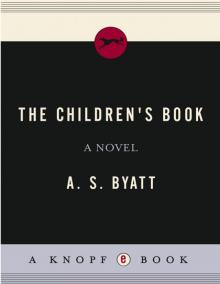 The Children's Book
The Children's Book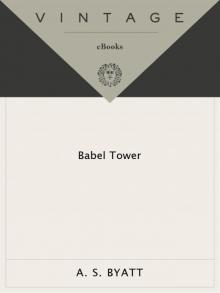 Babel Tower
Babel Tower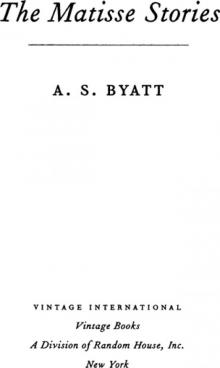 The Matisse Stories
The Matisse Stories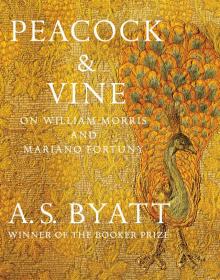 Peacock & Vine: On William Morris and Mariano Fortuny
Peacock & Vine: On William Morris and Mariano Fortuny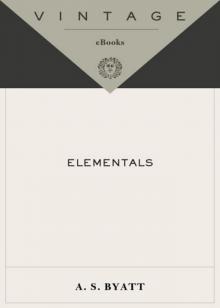 Elementals: Stories of Fire and Ice
Elementals: Stories of Fire and Ice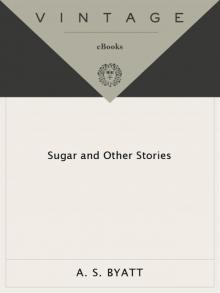 Sugar and Other Stories
Sugar and Other Stories Possession
Possession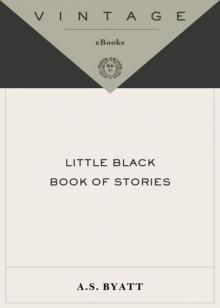 Little Black Book of Stories
Little Black Book of Stories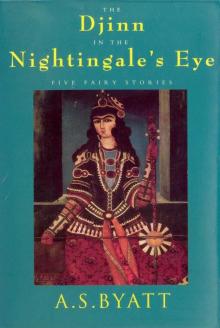 The Djinn in the Nightingale's Eye
The Djinn in the Nightingale's Eye The Virgin in the Garden
The Virgin in the Garden The Game
The Game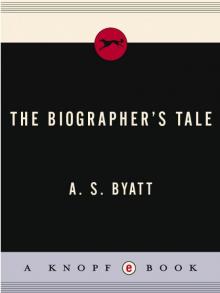 The Biographer's Tale
The Biographer's Tale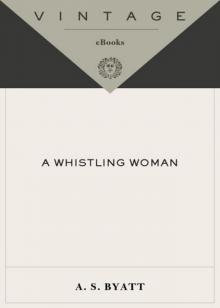 A Whistling Woman
A Whistling Woman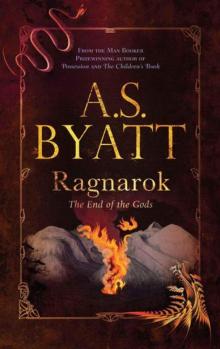 Ragnarok
Ragnarok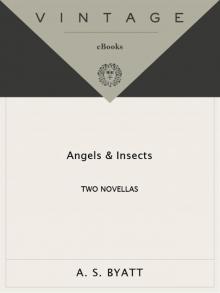 Angels & Insects: Two Novellas
Angels & Insects: Two Novellas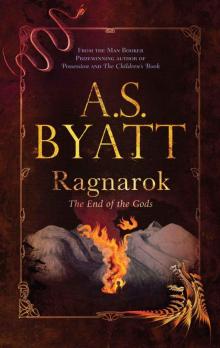 Ragnarok: the End of the Gods (Myths)
Ragnarok: the End of the Gods (Myths)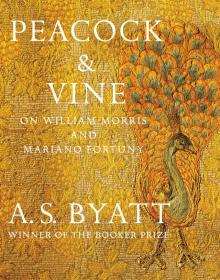 Peacock & Vine
Peacock & Vine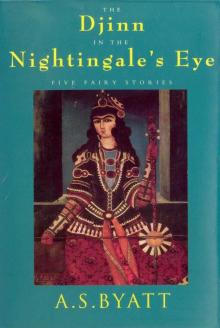 The Djinn in the Nightingale's Eye (Vintage International)
The Djinn in the Nightingale's Eye (Vintage International)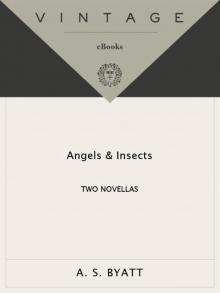 Angels and Insects
Angels and Insects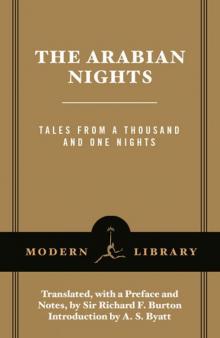 The Arabian Nights: Tales from a Thousand and One Nights (Modern Library Classics)
The Arabian Nights: Tales from a Thousand and One Nights (Modern Library Classics)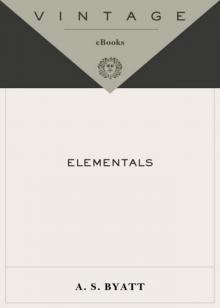 Elementals
Elementals